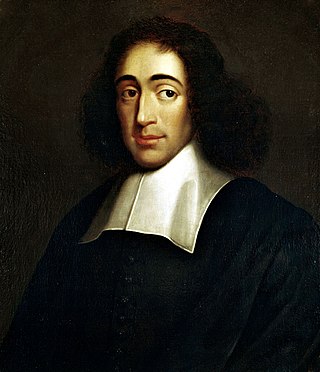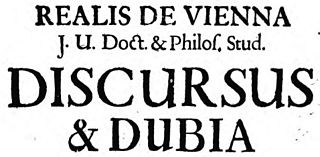Related Research Articles

Baruch (de) Spinoza, also known under his Latinized pen name Benedictus de Spinoza, was a philosopher of Portuguese-Jewish origin. A forerunner of the Age of Enlightenment, Spinoza significantly influenced modern biblical criticism, 17th-century rationalism, and Dutch intellectual culture, establishing himself as one of the most important and radical philosophers of the early modern period. Influenced by Stoicism, Thomas Hobbes, René Descartes, Ibn Tufayl, and heterodox Christians, Spinoza was a leading philosopher of the Dutch Golden Age.

Gottfried Wilhelm Leibniz or Leibnitz was a German polymath active as a mathematician, philosopher, scientist and diplomat who is credited, alongside Sir Isaac Newton, with the creation of calculus in addition to many other branches of mathematics, such as binary arithmetic, and statistics. Leibniz has been called the "last universal genius" due to his knowledge and skills in different fields and because such people became much less common after his lifetime with the coming of the Industrial Revolution and the spread of specialized labor. He is a prominent figure in both the history of philosophy and the history of mathematics. He wrote works on philosophy, theology, ethics, politics, law, history, philology, games, music, and other studies. Leibniz also made major contributions to physics and technology, and anticipated notions that surfaced much later in probability theory, biology, medicine, geology, psychology, linguistics and computer science.

René Descartes was a French philosopher, scientist, and mathematician, widely considered a seminal figure in the emergence of modern philosophy and science. Mathematics was paramount to his method of inquiry, and he connected the previously separate fields of geometry and algebra into analytic geometry. Descartes spent much of his working life in the Dutch Republic, initially serving the Dutch States Army, and later becoming a central intellectual of the Dutch Golden Age. Although he served a Protestant state and was later counted as a deist by critics, Descartes was Roman Catholic.
In philosophy, rationalism is the epistemological view that "regards reason as the chief source and test of knowledge" or “the position that reason has precedence over other ways of acquiring knowledge”, often in contrast to other possible sources of knowledge such as faith, tradition, or sensory experience. More formally, rationalism is defined as a methodology or a theory "in which the criterion of truth is not sensory but intellectual and deductive".
Early modern philosophy The early modern era of philosophy was a progressive movement of Western thought, exploring through theories and discourse such topics as mind and matter, is a period in the history of philosophy that overlaps with the beginning of the period known as modern philosophy. It succeeded the medieval era of philosophy. Early modern philosophy is usually thought to have occurred between the 16th and 18th centuries, though some philosophers and historians may put this period slightly earlier. During this time, influential philosophers included Descartes, Locke, Hume, and Kant, all of whom contributed to the current understanding of philosophy.

Anne Conway was an English philosopher of the Enlightenment, whose work was in the tradition of the Cambridge Platonists. Conway's thought is a deeply original form of rationalist philosophy. Conway rejected Cartesian substance dualism and instead, argued that nature is constituted by one substance. Against the mechanists, she argued that matter is not passive, but has self-motion, perception, and life.

In the philosophy of Baruch Spinoza, conatus is an innate inclination of a thing to continue to exist and enhance itself. This thing may be mind, matter, or a combination of both, and is often associated with God's will in a pantheist view of nature. The conatus may refer to the instinctive will to live of living organisms or to various metaphysical theories of motion and inertia. Today, conatus is rarely used in the technical sense, since classical mechanics uses concepts such as inertia and conservation of momentum that have superseded it. It has, however, been a notable influence on later thinkers such as Arthur Schopenhauer and Friedrich Nietzsche.
Steven Mitchell Nadler is an American/Canadian academic and philosopher specializing in 17th-century philosophy. He is Vilas Research Professor and the William H. Hay II Professor of Philosophy, and was Max and Frieda Weinstein-Bascom Professor of Jewish Studies at the University of Wisconsin–Madison. He is also director of their Institute for Research in the Humanities.

Cartesianism is the philosophical and scientific system of René Descartes and its subsequent development by other seventeenth century thinkers, most notably François Poullain de la Barre, Nicolas Malebranche and Baruch Spinoza. Descartes is often regarded as the first thinker to emphasize the use of reason to develop the natural sciences. For him, philosophy was a thinking system that embodied all knowledge.
Michael Richard Ayers is a British philosopher and professor emeritus of philosophy at the University of Oxford. He studied at St John's College, Cambridge, and was a fellow of Wadham College, Oxford, from 1965 until 2002. Among his students are Colin McGinn and William Child.

Stephen Gaukroger was a British historian of philosophy and science who spent the majority of his academic career in Australia. Gaukroger was Emeritus Professor of History of Philosophy and History of Science at the University of Sydney.
John Cottingham is an English philosopher. The focus of his research has been early-modern philosophy, the philosophy of religion and moral philosophy. He is a Professor Emeritus of Philosophy at the University of Reading, Professorial Research Fellow at Heythrop College, University of London, and Honorary Fellow of St John's College, Oxford. He is also a current Visiting Professor to the Philosophy Department at King's College, London.

Margaret Dauler Wilson was an American philosopher and a professor of philosophy at Princeton University between 1970 and 1998.

Gabriel Wagner was a radical German philosopher and materialist who wrote under the nom-de-plume Realis de Vienna. A follower of Spinoza and acquaintance of Leibniz, Wagner did not believe that the universe or bible were divine creations, and sought to extricate philosophy and science from the influence of theology. Wagner also held radical political views critical of the nobility and monarchy. After failing to establish lasting careers in cities throughout German-speaking Europe, Wagner died in or shortly after 1717.
This is a timeline of philosophy in the 17th century.
Alison Simmons (born 1965) is an American philosopher and Samuel H. Wolcott Professor of Philosophy and Harvard College Professor at Harvard University. Her primary scholarly interests are in early modern theories of mind, the relationship between mind and body, natural philosophy, and sensory perception. With Barbara Grosz, she is co-founder of the Embedded EthiCS program at Harvard, which embeds ethics lessons into computer science courses.
Susan James is a British professor of philosophy at Birkbeck College London. She has previously taught at the University of Connecticut and the University of Cambridge. She is well known for her work on the history of seventeenth and eighteenth century philosophy.
Catherine Warren Wilson is a British/American/Canadian philosopher. Wilson taught at the University of Oregon, City College of NYC, and was formerly Anniversary Professor at the University of York. From 2009 to 2012, she served as the Regius Professor of Moral Philosophy at the University of Aberdeen. She is known for her interdisciplinary studies of visuality, moral psychology and aesthetics, and especially early microscopy and Epicurean atomism and materialism.
Dutch philosophy is a broad branch of philosophy that discusses the contributions of Dutch philosophers to the discourse of Western philosophy and Renaissance philosophy. The philosophy, as its own entity, arose in the 16th and 17th centuries through the philosophical studies of Desiderius Erasmus and Baruch Spinoza. The adoption of the humanistic perspective by Erasmus, despite his Christian background, and rational but theocentric perspective expounded by Spinoza, supported each of these philosopher's works. In general, the philosophy revolved around acknowledging the reality of human self-determination and rational thought rather than focusing on traditional ideals of fatalism and virtue raised in Christianity. The roots of philosophical frameworks like the mind-body dualism and monism debate can also be traced to Dutch philosophy, which is attributed to 17th century philosopher René Descartes. Descartes was both a mathematician and philosopher during the Dutch Golden Age, despite being from the Kingdom of France. Modern Dutch philosophers like D.H. Th. Vollenhoven provided critical analyses on the dichotomy between dualism and monism.
Donald Paul Rutherford is a Canadian philosopher and an emeritus professor of philosophy at the University of California, San Diego. He is known for his research on early modern philosophy. Rutherford is a former president of Leibniz Society of North America (2010-14) and a winner of its Essay Prize (1992). He is an editor of Oxford Studies in Early Modern Philosophy.
References
- ↑ "Daniel Garber | Department of Philosophy". philosophy.princeton.edu. Archived from the original on 2020-06-14. Retrieved 2020-06-14.
- ↑ "Curriculum Vitae" (PDF). Philosophy.princeton.edu. Retrieved 16 August 2019.
- ↑ "Daniel Garber - Institut d'études avancées de Paris". Paris-iea.fr. Retrieved 16 August 2019.